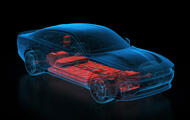Factorial batteries are said to have an energy density of more than 390Wh/kg
Fleet of modified Dodge Charger Daytonas will be used to validate performance of Factorial batteries
Stellantis will start road testing solid-state batteries made by American start-up Factorial in two years.
Factorial’s solid-state cells are said to have an energy density of more than 390Wh/kg, a marked improvement on the circa-270Wh/kg of many of today’s lithium-ion batteries. In real terms, that means electric cars with solid state batteries will possess significantly longer ranges and reduced weights compared with today’s cars.
Stellantis will fit a fleet of Dodge Charger Daytonas with the Factorial batteries in 2026, validating their performance and durability in real-world conditions.
The firm said cars based on the STLA Large platform (from Alfa Romeo, Maserati, Jeep, Dodge and Chrysler in the D- and E-segments) will be prioritised for the batteries.
The race to sell a production car with a solid-state battery is hotting up after years of manufacturer announcements and missed deadlines.
MG-owner SAIC recently announced that it will start equipping cars with the technology next year. Its IM L6 saloon uses a semi-solid-state pack that gives it a range of 497 miles between charges.
Nissan has said that its first solid-state EV will arrive in 2028, with batteries of around half the size and weight compared with today’s lithium-ion pack of an equivalent capacity.
Toyota is aiming to commercialise solid-state batteries in 2027 or 2028.
Chinese manufacturer Chery has said that its solid-state batteries (with an energy density of 600Wh/kg) will be ready for production in 2026.
The Volkswagen Group earlier this year announced that its PowerCo battery manufacturing arm has agreed to mass-produce solid-state batteries from American firm QuantumScape.
But not all manufacturers believe that they are the silver bullet they have long been touted as: Mercedes-Benz technology chief Markus Schäfer said earlier this year that solid-state “may not be necessary” because of “unexpected” progress with lithium-ion cells.
“So many people have worked on the conventional cells, making them so much better,” said Schäfer.







